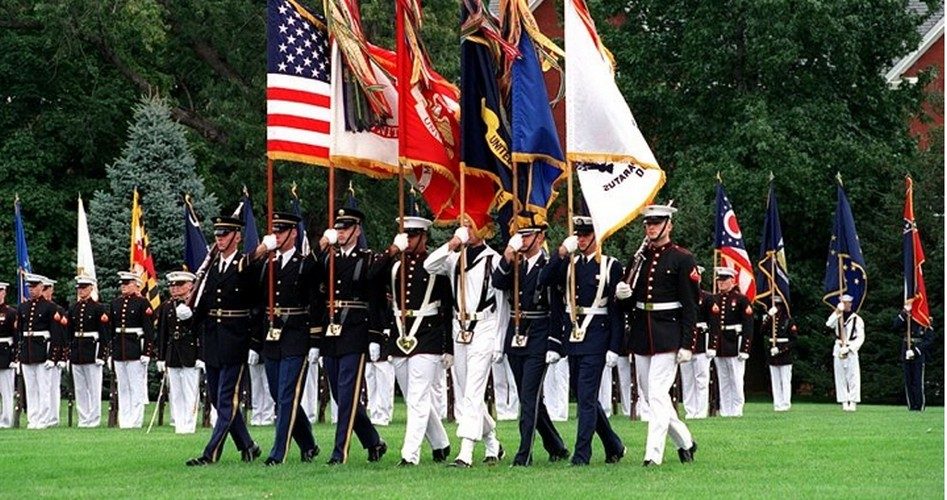
Earlier this month, West Point law professor William Bradford was forced to resign after a paper of his published in the National Security Law Journal in July suggested that “scholars” who oppose the war on terror are “treasonous” and should be detained by the government and perhaps be targeted as “unlawful enemy combatants.”
In another article entitled “Alea Iacta Est: The U.S. Coup of 2017,” Bradford posited that the military may have an obligation to overthrow the civil government if it acts contrary to the best interest of the country.
While that may sound like an extreme position — and likely is — results of a recent survey suggest that many Americans may agree with the spirit of Bradford’s Seven Days in May scenario.
British-based YouGov published the results of a poll it conducted earlier this month, and the findings are creating quite a furor online. For example, here’s how Daily Caller reported the results: “For many Americans, a coup in which the military seizes control of the federal government is starting to seem like a refreshing alternative to the existing administration, according to a new poll.”
While it is true that the survey’s findings suggest that there are a good number of Americans who admire the military and hold elected officials in low regard, the details are a bit less bellicose than the Internet-based media are reporting.
For example, regarding the public’s support for a military coup, the YouGov poll asked 1,000 adults the following question: “Is there any situation in which you could imagine yourself supporting the U.S. military taking over the powers of federal government?”
Results of answers to that question reveal that 29 percent of respondents said “yes.”
That’s hardly the pro-military takeover mandate being trumpeted by many outlets.
A bit more curious is the response to the next question on the poll: “If elected leaders of the federal government began to violate the Constitution would you support or oppose the military stepping in to take control of the federal government?”
To that hypothetical, 43 percent of respondents answered in the affirmative. Other answers were equally interesting, especially in light of the majorities who apparently support a very expansive role for the U.S. armed forces in domestic affairs.
When asked if “the military has a duty to protect the Constitution against domestic enemies?” 72 percent of those polled said that it does.
It’s difficult to square this reported opinion with another poll wherein a majority of Americans support the use of drones to kill alleged enemies of the United States.
Killing anyone — even a supposed “terrorist” — without due process of law, is unconstitutional and thus according to the results of the YouGov poll, 72 percent of Americans would support the refusal by military commanders to fire a missile at a target who has not been found guilty of a crime.
The YouGov poll did ask a question related to this situation, however. “Should active duty members of the U.S. military always follow orders from their military superiors, even if they feel that those orders are unconstitutional?” respondents were asked.
Thirty-nine percent of those surveyed said that members of the armed forces of the United States should not follow unconstitutional orders.
Confusing.
Who is the arbiter of constitutional and unconstitutional? That is the most relevant question, and one that is not asked.
Americans don’t need a poll to tell them that the federal government considers itself “the decider” of what is within or without their power.
If that’s true, however, what purpose would the 10th Amendment serve? Even the most sanguine political observer would admit that the federal government could, would, and does rule that its every act is constitutional.
This is the case today, and the consolidators genuinely believe that there is nothing they can’t do, no law they can’t pass, and no individual or government entity that can prevent them from enforcing the thousands of fiats masquerading as laws.
If we don’t change our ways, soon we will learn that the loss of liberty is the worst of all possible fates and it always has and always will await the ignorant and the apathetic. There is not a party on Capitol Hill that supports the application of the 10th Amendment to questions of constitutional conformity.
In fact, both major political parties prefer keeping themselves in control of questions of whether authority to pass this or that legislation is provided for in the enumerated powers assigned to the federal government in the federal government.
As a result, Washington considers the states nothing more than administrative subordinates whose continued existence is tolerated only so long as they faithfully facilitate the execution of the millions of mandates of the multitude of federal programs.
The checks and balances of the Constitution and the separation of powers provided therein are meant to be the first layers of defense against tyranny, not the last or the only as the statists would have you believe. The people acting through their state governments are the final levee protecting the people as individuals from drowning under the flood of unconstitutional federal laws, regulations, and mandates.
States unwilling to be reduced to subordinates, subjects, and slaves must take as their motto: Sovereignty is not secession, rejection is not revolution, and nullification is not negation of the union.
For now, though, it seems Americans would rather respond to polls of no import than take the opportunity given them every two years to replace these congressmen that a reported 71 percent of those polled believe act in a way that benefits themselves personally rather than the country at large.
Voters committed to holding their representatives accountable for their fidelity to the oath they swear to “preserve, protect, and defend the Constitution from all enemies, foreign and domestic” could fire those who depart from this obligation every two years and send others to fill the chairs of the unfaithful.
Furthermore, state legislators who consider themselves lawmakers rather than proxies for their colleagues in Washington, D.C., could foment real revolution without ever firing a shot.
As it stands, participating in polls is a substitute for substantive participation in the political process.
And, although Daily Caller reportsthat “the survey results revealed a clear political divide. Republicans were more than twice as likely to rate a potential coup more highly than Democrats, with the two parties polling 43 percent and 20 percent, respectively,” there seems to be a tacit agreement among Americans to relinquish their power over their government and a corresponding consensus among their elected officials to ignore constitutional limits on their authority.



